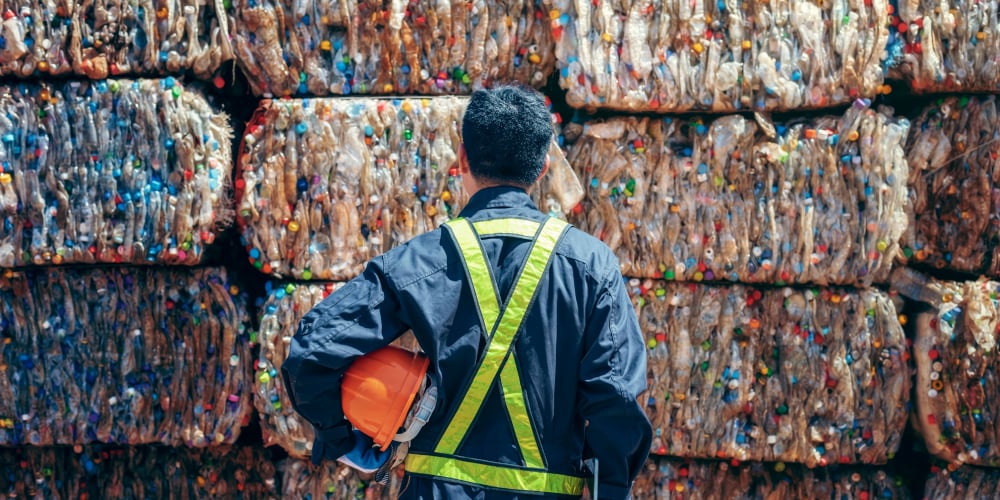Job sources are expected to come from new recycling plants, compost trucks and product repair services. Besides, Chile is leading the way to develop the value chain associated with a sustainable packaging industry. In this context, InvestChile and Fundación Chile are organizing the webinar ‘Plastic Recycling Infrastructure: Investment Opportunities in Chile.'

Following two years of work, which included consultancy from a team of experts and a public consultation process, the Environment Ministry (MMA) has presented the “Roadmap for a Circular Chile by 2040” (in Spanish).
The main objective of the roadmap is for Chile to implement a regenerative circular economy that promotes sustainable development by 2040 and its first target is to generate 100,000 green jobs by 2030.
The head of the Environment Ministry’s Circular Economy office, Guillermo González, explains that the regenerative circular economy goes beyond merely generating fewer adverse impacts, moving towards production and consumption methods that generate positive impacts on the environment, specifically on ecosystems.”
Chile is leading the way to develop the value chain associated with a sustainable packaging industry. The new legislation, the Chilean Plastics Pact as a key public-private initiative, combined with Chile’s attributes, foster the ideal scenario for new business.
In this context, InvestChile and Fundación Chile are organizing the webinar ‘Plastic Recycling Infrastructure: Investment Opportunities in Chile,’ which will be held on Thursday, September 9th.
The themes of the plan
The plan has four circular themes - innovation, culture, regulation and territories - as well as seven long-term targets to be achieved by 2030 and 2040, which aim to reduce waste, produce materials and create green jobs.
The potential global economic value of the circular economy is estimated to be around US$4.5 trillion and it could create 95 million green jobs by 2030. Here in Chile, it is expected to generate 100,000 jobs by 2030 and 180,000 by 2040.
González believes that sustainable and inclusive development boosts economic growth, and the best way to achieve this for the country is through a circular economy.
“We aim to create 180,000 new green jobs, sustained by the circular enterprise opportunities that exist,” says Carolina Schmidt, Environment Minister.
The ministry is still working with the Economic Commission for Latin America (ECLAC) to define the methodology and details of how many of these 180,000 jobs will be generated by the public sector and how many by private enterprise. In any case, González says that these new jobs will come about as a result of the “giant step forward that will be taken by many industries over the next decade,” propelled by instruments such as the Law on Extended Producer Liability (Ley de Responsabilidad Extendida del Productor, REP) and other actions included in the roadmap.
González explains that these new green jobs will arise from the increase in recycling plants across Chile, door-to-door composting trucks, new waste classification plants and labor for product repair services.
There will also be an increase in the demand for professionals specializing in ecodesign. “We hope to have a large number of people working in this specialist area to provide services to companies to redesign their processes and products,” says González.
Targets, initiatives and investment opportunities in Chile
The circular economy roadmap includes seven targets - including green jobs - like reductions in municipal waste and in waste generated per unit of Gross Domestic Product (GDP), an increase in the material productivity and recycling rates, and the recovery of sites affected by illegal dumping of waste.
In terms of measuring compliance with targets, the recycling rate is already measured by the National Waste Declaration System (Sistema Nacional de Declaración de Residuos, Sinader), which provides real-time monitoring.
These targets will be reached through 27 initiatives that revolve around the four circular themes, specifically innovation, culture, regulation and territories, with actions driven by public and private stakeholders, such as ministries, regional governments, the Federation of Chilean Industry (SOFOFA), Chilean Economic Development Agency (CORFO), the Chilean Chamber of Construction and Fundación Basura.
The most important initiatives, according to González, are those associated with the potential of industrial waste that “is currently underutilized,” and regulatory adjustments for waste management, green investment and an expansion of the priority product list under the REP law. In fact, the roadmap mentions new priority products such as fishing and aquaculture tackle or parts, expired medications, furniture, cigarettes, expired pesticides or textiles.
To learn more about business and investment opportunities in Chile, read the following article.
Source: Diario Financiero



%2017.11.51.png)

